20 Unexpected And Surprising Uses For Vegetable Oil
1 Shine Wooden Kitchenware
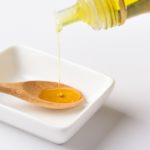
While vegetable oil is necessary while cooking, it can also help you out in the kitchen when the stove isn’t on. If you have a large supply of wooden cooking utensils, you’ve probably noticed that they start to look dull and rough after continuous use. With a little vegetable oil, you can have your wooden kitchenware looking brand new.
Simply rub a bit of vegetable oil into your wooden utensils. The oil will restore the wood’s shine, leaving your kitchenware gleaming once again. Don’t bother buying new kitchen tools when you can restore your old ones so easily.
2 Grease Up Measuring Cups

While there are plenty of uses for vegetable oil in other rooms of your house, it’s likely you haven’t exhausted all the possibilities of this solution in your kitchen. For example, vegetable oil is the perfect way to grease up your measuring cups, allowing sticky ingredients to flow right out of the container and into your dish.
When cooking with ingredients like jelly, honey, or syrup, getting the right portion proves to be a challenge. Although you fill the measuring cup with the appropriate amount, a large part of the substance tends to stick to the cup, rather than taking its appropriate place in your dish. To put an end to this problem, simply rub vegetable oil around the inside of your measuring cups before each use. With a little oil, the ingredients won’t be able to stick to the cup, allowing them to slide out more easily.
3 Moisturize Dry Skin

No matter how well we try to take care of our skin, it does tend to dry out from time to time, particularly during the winter months. Cold weather and high winds are all tough on skin, which can lead to chapped hands, lips, noses, and other areas of your body.
While using a store-bought lotion might provide some relief, at times the ingredients and fragrances included in moisturizing products only serve to irritate your skin even more. If you need quick relief, turn to vegetable oil. By rubbing the vegetable oil into the dry parts of your skin, you can moisture those rough areas and provide your skin with instant relief.
4 Polish Stainless Steel Appliances
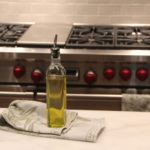
If you have stainless steel appliances in your home, it’s absolutely imperative to keep them clean. Smudges and built-up grime completely ruin the modern aesthetic of your kitchen. Thankfully, keeping your appliances shiny falls under the large umbrella of uses for vegetable oil.
Next time you clean your appliances, turn to vegetable oil instead of chemical cleaners. Simply put a few drops of vegetable oil onto a soft rag. Then rub the rag against your stainless steel appliances. The vegetable oil will easily buff out smudges and fingerprints while gently removing dirt and grime. You’ll be left with shiny appliances that almost look brand new.
5 Fix Squeaky Hinges

If squeaky hinges around your house are driving you crazy, vegetable oil might be the perfect solution. A favorite among the uses for vegetable oil is the ability to lubricate creaky hinges, putting an end to that constant squeaking for good.
Simply rub a bit of vegetable oil into your creaky hinge. Then move the door back and forth a few times to make sure the oil soaks into every nook and cranny. The oil will lubricate the tired door hinge, preventing that irritating squeak. If the squeak comes back, just apply more vegetable oil regularly to ensure a creak-free house.
6 Prevent Sticky Lids
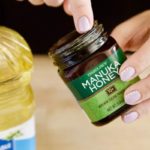
If you’re housing sticky ingredients like honey, syrup, or agave nectar in jars, you may have noticed that getting the jars open becomes harder and harder after each use. That’s because the sticky substance inside tends to make its way to the rim of the jar, effectively “gluing” the lid shut. You can try to muscle the jar open, or you can solve the problem with a little vegetable oil.
Once you open the jar for the first time, rub vegetable oil around the rim. The vegetable oil will create a barrier that keeps the lid from sticking to the jar, allowing the top to screw off easily the next time you need to open it up.
7 Polish Wood Furniture
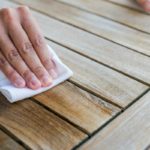
If your wood furniture is starting to look a bit dull, don’t despair! Just as a little oil can add some shine to your stainless steel appliances, one of the many uses for vegetable oil is the ability to add a fresh sheen to wood furnishings.
Next time you notice a dullness on the wood furniture in your home, grab a clean cloth and some vegetable oil. Apply the vegetable oil to the cloth and run the cloth over the wood. Allow the oil to soak in for a few hours, then wipe off any excess. The oil will add a new brilliance to your wood, brightening and polishing your furnishings until they’re gleaming.
8 Remove Splinters

Getting a splinter is never an enjoyable experience, but it’s particularly frustrating when the tiny scrap of wood is buried deep under your skin. On those occasions, it doesn’t seem any amount of digging with your tweezers will actually remove the wood. But before you start feeling hopeless, grab your vegetable oil.
Soak a cotton ball in vegetable oil and apply it to the area on and around your splinter. Allow the vegetable oil to soak into your skin for several minutes. The vegetable oil will soften your skin, making it much easier for you to reach in with your tweezers and pull that pesky splinter out.
9 Protect Cast-Iron Cookware
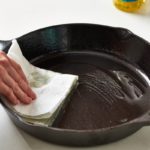
A cast-iron skillet or other cast-iron cookware item is such a handy thing to have in your kitchen. But if you want to keep the skillet working perfectly for a long period of time, you need to do more than just wash it after every use.
To keep your cast-iron skillet from rusting, apply a layer of vegetable oil after each wash. In addition to keeping the pan rust-free, the vegetable oil will maintain a “seasoned” layer on the cast-iron pan that will keep your food from sticking next time you cook.
10 Clean Your Car

When washing your car at home, it’s difficult to remove all the built-up grime that tends to stick to the outside of your vehicle. Bugs that accumulate around the grill, brake dust that builds up on your hubcaps, and dirt that sticks to the paint are all difficult to remove, especially if they’ve been sitting there for a long period of time. But with a little vegetable oil, you can make cleaning your car a breeze.
Before you wash your car with water, apply a bit of vegetable oil to a rag, and wipe down the dirtiest areas of your vehicle. The vegetable oil will help to soften that built-up grime, allowing you to easily wipe it off. Plus, the oil will create a coating that will make it hard for things to stick to your vehicle in the future, keeping your car cleaner for a longer period of time.
11 Use As Shaving Cream

There are actually a surprising number of uses for vegetable oil in the self-care realm. For example, vegetable oil can be the perfect solution if you find yourself in need of a shave with no shaving cream on hand. Rather than running out to the store or delaying your shave another day, just grab your vegetable oil.
Slather the vegetable oil all over your skin. Then shave as normal. The vegetable oil will act similarly to shaving cream, allowing for a nice close shave. Plus, the vegetable oil will simultaneously moisturize your skin. After you try this hack, you may never go back to shaving cream.
12 Polish Leather Shoes
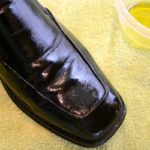
You don’t need some fancy shoe shine to keep your leather kicks looking brand new. In fact, all you need to polish your leather shoes is a bit of vegetable oil.
Apply a few drops of vegetable oil to your leather shoes and rub it in with a soft cloth. The vegetable oil will help to remove any stains from your shoes while simultaneously adding a bit of shine. In the end, your shoes will look brand new once again. Repeat the process every time the shoes start to look a little dull to keep them in tip-top shape.
13 Soothe Your Pet’s Paws

When the weather is too hot or too cold, your puppy’s paws will suffer. But instead of foregoing the walk altogether to keep your dog’s feet safe, try using a little vegetable oil to soothe injured pads.
While lotions aren’t safe to use on dogs, vegetable oil will moisturize their paws, allowing the tough skin to heal. The oil will soothe your pup’s feet, and it’s completely safe if they decide to lick their paws after you’ve applied it. Plus, it’s the cheapest way to provide your dog with a little relief.
14 Repair Frizzy Hair

If you go too long between haircuts, your poor locks will be cursed with breakage and split ends. When your hair isn’t as healthy as it could be, it tends to get frizzy and brittle, especially around the ends. But with a little vegetable oil, you can restore your hair to a silky-smooth state.
Start by including vegetable oil into your shower routine. After you wash your hair, apply a little vegetable oil with your conditioner. The oil will help to wrap your strands in moisture, repairing damage, and softening each individual lock. After just a few applications, your tresses will be soft and smooth once again.
15 Soften & Smooth Rough Foot Skin

Our poor feet go through so much. They hold our bodies up all day long, and they often don’t get the pampering they deserve. But among the many uses for vegetable oil is the ability to finally make your feet baby-soft once again.
Next time you notice that rough skin building up around your heels, grab your vegetable oil. Slather your feet in oil and don a pair of socks. Allow your feet to soak overnight, then rinse the oil off in the morning. The vegetable oil will naturally moisture your rough skin, leaving your paws smooth and soft.
16 Remove Paint From Hands

If you’ve taken on a DIY project and ended up with paint all over your hands, don’t panic! Instead of scrubbing your hands to death trying to remove that pesky paint, you can take advantage of one of the many uses for vegetable oil.
Simply pour a bit of vegetable oil onto your hands and allow it to soak in for roughly ten minutes. Then wash your hands as normal. The oil will soften up the paint, allowing it to slide right off your fingers under the water.
17 Remove Stickers & Residue
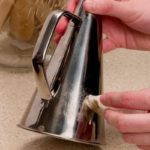
Stickers aren’t really meant to be permanent, and yet it seems like they are. If you apply a sticker anywhere, you’ll find that it’s quite difficult to get off when you want to remove it. If you do manage to dislodge the sticker, you’ll be left with a yucky residue that never really goes away. That is, unless you use vegetable oil.
Before you even touch the sticker, grab your trusty vegetable oil. Apply a few drops to the sticker and allow it to soak in a for few minutes. Then, pull the sticker right off—it should be easy to remove with the help of the oil. If there’s residue left behind, gently rub it with a cloth dipped in vegetable oil and it should come right off.
18 Protect Wicker Furniture
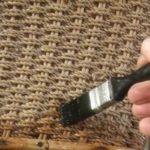
Wicker furniture is a great choice for adding comfort and charm both inside and outside your house. But unlike normal wood, wicker furniture needs an extra layer of protection. Over time, the small pieces of wood will dry out and begin to crack, which will entirely ruin your classy interior design.
To keep your wicker furniture in tip-top shape, take advantage of the many uses for vegetable oil. Pour the oil onto a clean cloth and gently rub the cloth over your furniture. Allow the oil to soak in for several hours before wiping your furniture again with a clean cloth to remove any excess oil. The oil will add a protective barrier to your furniture that moisturizes the wood and prevents cracking. Repeat the process every few months to ensure your wicker furniture stays in pristine condition.
19 Create Non-Stick Garden Tools
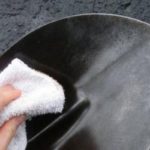
There are few things more satisfying than a day spent in the garden. But even though gardening is meant to be a little challenging, you want it to be as easy and enjoyable as possible. It’s certainly not relaxing to work in your garden if you have to constantly scrape away stuck-on dirt from your tools every few minutes. Thankfully, vegetable oil provides a solution.
Before you start gardening, wipe down your tools with vegetable oil. The vegetable oil will create a slick surface that won’t allow dirt to stick. The dirt will run right off, saving you time and energy as you work.
20 Separate Stuck Glasses

While stacking drinking glasses on top of each other certainly saves space in your cupboard, you run the risk of those glasses getting stuck together. If the glasses are fragile, yanking them apart will result in a disastrous mess. What’s the solution? Vegetable oil, of course.
Instead of yanking the glasses apart, pour a little vegetable oil around the rim of the bottom glass. The oil will create a slick surface, allowing the cups to easily separate from one another. Once they’re apart, wash all the oil off to ensure the glass is clean…and maybe don’t stack those glasses on top of each other again.
